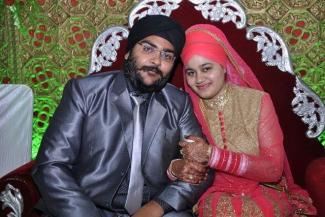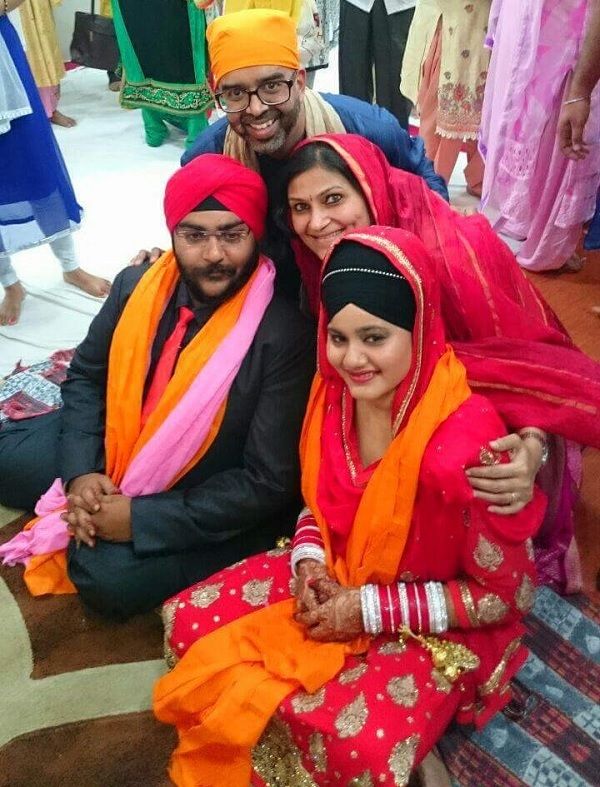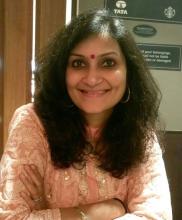
Dr Divya Parashar, head of the Department of Rehabilitation Psychology at the Indian Spinal Injuries Centre, New Delhi, shares an example of how people can choose companionship and love over obstacles and prejudices.
I am often met with surprised looks when I share stories of people with spinal cord injuries dating or getting married and having kids. The common misconception is that they're unable to engage in sex, and often are seen as "damaged goods." On the contrary, there are many examples of people living in the community who have redefined what sexuality means, have found ways to become intimate, raise families, and yes, go on to lead lives of quality and contentment. Read on:
“Ma’am, I got engaged!” pinged my phone at 6:35 AM.
I didn’t need any more invitation to get drawn into an animated conversation with Mandeep about the wedding.
“It’s this coming weekend, and Sir & you have to come,” he said.
I smiled and said I would book my tickets pronto. I was transported back in time, to about two years ago when Mandeep was visiting Delhi and he wanted to come by ISIC to meet me.
“How will you get here?” I asked, thinking about the hot, summer day, & that he was traveling alone.
“I’ll take the Metro and then an auto from the station.”
“Mandeep, that’s too much of a hassle to come see me. Are you sure?”
He chided me on the phone, “Ma’am, aap aisa bologey? Aap hee ne toh sikhaya hai.” (“You’re saying this? You’re the one who taught me!”)
And I laughed at my faux pas, and found my Guru in him. He taught me a valuable lesson on curbing my somewhat misplaced protective instincts, about reinforcing self-reliance with pride and joy. What a wonderful reunion that was at the time.
Back in the present, the week went by in a flurry of exchanges about Narayan and I being there for the wedding and how he wanted to surprise his fiancé Supreet, with our arrival. We landed in Lucknow and headed to the hotel where the wedding party was staying. We were to be one of them, family, in that sense. As we arrived, Mandeep, Supreet and their families came to the lobby; hugs and congratulatory wishes were exchanged, and I basked in their happiness. Finally, the day about which we had spoken about years ago, in anticipation, had arrived.
Through the evening, I kept telling him that I had not seen a busier dulha because he was constantly on the move, making sure everyone was taken care of, with frequent stops by our room to see if we were comfortable, if we’d had chai, if we were hungry, if we need anything at all. And the same thing happened the first thing the next morning. He was the busy one, even on the day of his own wedding.
We reached 15 minutes before the ceremony was to begin, and sat in the gurudwara in silence, the granthi sitting calmly, exuding serenity. People started trickling in, and then Mandeep arrived, looking dapper in a black suit, red tie, and a red turban. We went to greet him, he touched our feet, and as he went to take off his shoes, we took our places on the floor and waited for the Anand Karaj to begin.
My eyes were on the entrance watching Mandeep. He got down on the floor from his wheelchair and traversed the length of the gurudwara to bow his head in obeisance to the Guru Granth Sahib. The faith, conviction and determination that marked his every step forward were truly awe-inspiring; not just his devotion to the Granth Sahib but to his companion, Supreet. They were one and the same it seemed. I knew the next 90 minutes would teach me about the intricacies of strength, frailty, relationships, letting go, perceptions, commitment, and what I have felt and seen rarely in this world: divine love between two people.
As Supreet took her place next to Mandeep, the ceremony began, with the soulful gurbani touching a chord as it always does. It was now time for the Chaar Lavan (the four rounds) where the marriage verses are read at intervals from the Guru Granth Sahib. As is customary, the bride and groom are to make a symbolic circle around the holy text as the lavan are sung, they take their seats after each lavan, and it is repeated four times. Simple? Not.
The granthi, in his commanding voice, said, “There is a reason the bride and groom can’t take the phere (rounds) and there will be no debate, no criticism around it.” He went onto explain that they had called upon the highest authorities of the faith and sought their advice on how the ceremony should be conducted. Their instruction was that love and commitment supersede all limitations, and hence the bride and groom can be seated while the verses are rehearsed and the lavan are sung.
The granthi concluded with these words: “If any of you have any doubts, hesitation, or apprehensions around this, please put them to rest.”
There was an acquiescing silence. What the granthi was doing was changing mindsets, not merely conducting a wedding. And my eyes welled up as they sang the first lavan, and the next, and the next, and the next, each one symbolizing the union of two souls. Souls, not bodies. And that, I realized, is where the difference lies, between divine and earthly love. And as simply as that, the singing of the traditional hymn Vyah hua merey babula (O Father, I am now married) marked the end of the wedding ceremony.
I thought it was over, and I could now finally wipe the remaining tears of joy, but the granthi wasn’t done yet. He had a few more words of wisdom to impart. What reverberated around the room at that point wasn’t just the granthi’s words but the effect they had on the people in the Gurudwara.
“This union has been met with many obstacles, people have criticized it, they think it could be jinxed because the lavan were not done in the customary style, but I would like to tell them that these two people have shown us what it means to have true devotion, faith, and love, and for that, I am thankful to them. May this union be blessed.” The Guru’s words through gurbaani & the granthi’s wisdom on how to live life with honesty, integrity, & selfless love stay etched as the most beautiful ceremony I have witnessed in recent times.
Because, this was no ordinary wedding, this was a lesson in breaking stereotypes and celebrating love. Love, here, between a man paralyzed waist down since he was 3 years old, and a woman who has known him since childhood, who has grown up with him. She has been there with him, all along on this journey, known his struggles, his suffering, his joys, his angst, his successes and the fears of his dreams being shattered. But they fought, persevered, persisted and finally found their way. And here they are, standing on a solid foundation they laid brick by brick over time.

Pic: Dr. Divya Parashar with her husband and the young couple Mandeep and Supreet
This skepticism and disdain normally visible around the rare marriage of someone with a disability was silenced by the granthi, not solely on religious grounds, not solely through the wisdom of the faith, but through the reinforcement of the belief in the goodness of people, and the value placed on love, honesty, commitment, and a simple earnestness.
People’s perceptions are amusing, and I must add, sometimes, heart-breaking.
“Can they, you know, even have sex? What about children?” I have been asked this by people a lot when we’ve spoken about people with disabilities living a life, just like everyone else. So yes, that includes working, dating, marriage and the like. Things that we all take for granted at some level, but for them, it may often be a path rife with obstacles. A lot of these questions stem from ignorance, some from curiosity, and some from a narrow worldview of why anyone would want to marry someone with a disability, be it hidden or a very apparent physical one.
Yes, we bring it down to just this, stripping them of their privacy and dignity, and reducing the strength of their overarching love by our assumptions and judgments, and a skewed perspective on just what makes relationships work.
And yes, they find ways to make things happen, or they make their peace with it, or a bit of both, like most of us do. The possibilities are endless, it’s just what they set their mind and heart to, and that acts as a catalyst to surge ahead, despite the environmental, attitudinal and other barriers they may face.
What makes a difference to my friends like Mandeep and Supreet? It is just the strong presence of their companion in their life, every step of the way. They go about rebuilding their lives in light of their present limitations, recognizing their strengths, redefining, rediscovering themselves and each other, sharing a vision, hopes, dreams, happiness, and sorrows. And what marks the journey is an unflinching commitment to each other despite the roller coaster ride of emotions, to find a way through each crest and trough, and to persist through it all. No compromises, no sacrifices, no adjustments.
This is how it is. It is no romantic love that waxes and wanes with time. It is above and beyond. Love that sees beyond seeming imperfections, that embraces and accepts wholeheartedly, love that first dwells within, and then extends to and connects with the inherent, changeless, formless beauty of the companion.
I was fortunate to witness that divine love.
Dr Divya Parashar heads the Department of Rehabilitation Psychology at the Indian Spinal Injuries Centre, New Delhi. After spending about 8 years in the US, she returned to India to pursue her work in positive psychology. Her work is mainly in the field of trauma, providing support to people with spinal cord injuries. Her empathy with her work comes through in the blogs she writes, which are topical as well as enlightening.







